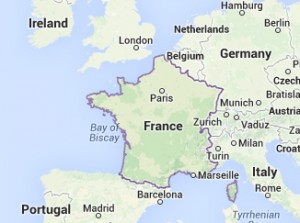
The 24-year-old IT student Sid Ahmed Ghlam’s plans were exposed purely by chance after he called an ambulance saying he had been shot during an armed robbery at his Paris home, prosecutor Francois Molins told journalists.
However, police uncovered an arsenal of weapons in his car and home, and detailed plans to attack one of two churches, as well as DNA evidence linking him to the murder of a woman who was found shot dead in her car over the weekend near the capital.
The suspect, who was admitted to a Paris hospital after his arrest, was known to intelligence services over comments on social networks expressing his desire to go and fight in Syria alongside jihadists, said Interior Minister Bernard Cazeneuve.
Paris is still on high alert with memories fresh from a jihadist killing spree that left 17 dead in January.
BACKSTORY: 12 dead in attack on Paris newspaper, including the editor
Police called to the scene where Ghlam was wounded found traces of his blood in the car as well as a Kalashnikov rifle, handguns, bulletproof vests, several cellphones, a laptop and documents on “potential targets and how to carry out attacks,” said Molins.
Another three Kalashnikovs, police armbands and vests, and documents in Arabic mentioning jihadist groups Islamic State and Al Qaeda were found at his home.
The city prosecutor said that Ghlam had told police “far-fetched” tales of how he had received the bullet wound to his leg, such as that he had shot himself while trying to throw his weapons into the Seine river.
Analysis of his communications equipment indicated Ghlam “was in touch with another person who could be in Syria on how to carry out an attack, with the latter clearly asking him to target a church”, said Molins.
A source close to the investigation said Ghlam appeared to have carefully calculated how long it would take police to respond.
Several members of his entourage and family have since been detained, some of whom sympathise with radical Islam, sources close to the investigation said.
On Wednesday, his 25-year-old girlfriend was taken in for questioning. The sources said she was a convert to Islam and was the only woman in her neighborhood who wore Islamic garb.
‘Unprecedented terrorist threat’
The arrest comes some three months after Islamic extremists gunned down 12 people at the Charlie Hebdo magazine, a policewoman and four others at a Jewish supermarket in a three-day reign of terror in the French capital.
The attack sent shockwaves around the world, and prompted several reforms in France including controversial new spy laws that are currently being debated in parliament.
French Prime Minister Manuel Valls on Wednesday reiterated government warnings that the country was facing an “unprecedented terrorist threat”.
“To target a church is to target a symbol of France, the very essence of France,” he said after visiting the two churches in Villejuif that had been possible targets.
“A terrorist act has been averted. It is not the first, there have been others in recent weeks and recent months,” President Francois Hollande said.
French bishops urged followers not to give in to fear.
“The terrorist threats, whatever they may be, seek to sow fear. Catholics will not give in,” they said in a joint statement.
Mystery murder link
During their investigations police discovered one of Ghlam’s guns had been used to shoot young mother Aurelie Chatelain, an unemployed dance enthusiast who was found dead in the town of Villejuif near Paris on Sunday.
It is the same town where the suspect planned to carry out his attack, according to Molins.
Ghlam’s link to the woman was not clear.
Chatelain was found shot once in the passenger seat of the vehicle, with her laptop still plugged in. There were also traces of blood on the driver’s seat.
Molins said Chatelain’s blood was found on one of Ghlam’s jackets.
The 32-year-old mother had just come to the area from northern France to take a pilates training course and had written of how happy she was to be there on her Facebook page on Saturday evening.
Hundreds of French nationals have joined jihadist ranks in Iraq and Syria, accounting for almost half the European fighters there, according to a report released this month by the upper house Senate.
Authorities fear some will return and commit attacks on home turf.